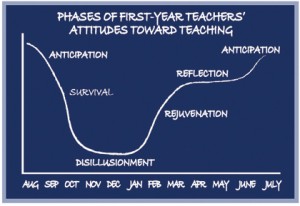It’s Progress Report time in many school boards this week. Once again, ETFO colleagues have typed and tweaked their thoughts about student stemming from conversations, observations, and products onto reports that capture “the learning” thus far. This annual first rite of assessment seems to come earlier and earlier each year, but is an important opportunity to map out the learning for then next 7 + months. Then there’s the meeting scheduling and organizing in addition to our already crammed days. So, how are you doing?
Have you had time to catch your breath since the start of the year?
I know the first weeks in the classroom seem to fly by for all of us. Regardless of years experience, it’s a hectic time of year. This can be especially difficult for new teachers who find themselves working before/after school as well as during evenings and weekends at home to plan, prepare, and assess. All this, in addition to trying to have a personal life that may include time with friends and family or just to be still. To no one’s surprise, the hours that educators invest in their calling are often spent in equal proportions in and out of the classroom. So how are you doing?
What would you change about the first 11 weeks of your year?
Over the years, I have enjoyed numerous conversations with new teachers at Progress Report time. For many new educators, it is the first time that they have had the time to reflect on what has gone on since the first bell in September. Many have shared that they are tired and feel a little overwhelmed by the pace and volume of work. It is not uncommon for new teachers to go through a case of the November Blahs where their energy level has waned a bit from the beginning of the year.

The first question I usually ask after “So how are you doing?” is, “Are you connecting with your colleagues to divide and conquer or are you stuck inside the walls of your classroom?” In my first year as a teacher, I made the mistake of not asking for help because I thought I could solve my own problems as they presented themselves. I did not want to appear weak to my new colleagues or admin. Needless to say, come November of the first year, things were deteriorating. So I suffered. Which means my students suffered too.
Long nights, failed planning, missed opportunities, and frustration were my regular companions at work and at home. I did not feel like I was taking advantage of the natural mentors in the building that first year. However, by my second year, my eyes and mind were open to any and all who were willing to offer their wisdom, guidance, and resources. By taking myself out of my fortress and asking for help I was able to redirect/rescue/re-invigorate my instruction and outlook.
After that point, suffering was optional. I chose to seek out the support of others when things became murky or began to go off course. It was humbling to know that the people I turned to for help had my best interests at heart. Knowing that I did not have to have it all together every moment of the day was like removing a giant gorilla from my back that was constantly whispering, “You don’t need any help. You can do this on your own. Don’t let anyone think your weak.”
Having a peer mentor to turn to has become a cornerstone of my personal development. In turn, I try to support my colleagues when they need someone in their corner. Perhaps when this time rolls around each year the first question I ask teachers is, “So how are you doing?”
